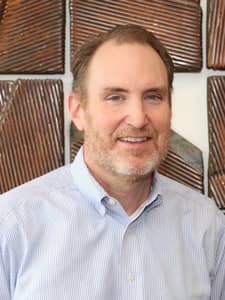
As director of the Academy for Population Health Innovation, Michael Dulin operates on the leading edge of the industry, exploring how technology can help communities address their most pressing public health challenges. Among the models gaining traction with practitioners is precision medicine, an approach to health care with the potential to revolutionize how doctors keep people healthy and treat them when they get sick. As organizations nationwide put precision medicine into practice, the opportunities it brings for disease treatment and prevention are enormous. But the challenges are also very real. Grappling with those challenges and taking the next steps were the focuses of the Healthcare Information and Management Systems Society Precision Medicine Summit earlier this summer, where Dulin was a featured speaker.
UNC Charlotte Communications caught up with Dulin to learn more about the future of precision medicine, and how the model has had a personal impact on his life.
Why is precision medicine such a promising approach for disease prevention and treatment?
Precision medicine uses a patient's genetic information and demographics to specifically tailor treatment plans that are more likely to be effective. This is also true for preventative medicine as some patients may benefit more from certain types of lifestyle and behavioral changes than others. In both domains, precision medicine should be used in ways that empower patients to make more informed decisions about their health care options.
What specific applications do you see for precision medicine in the Charlotte region?
UNC Charlotte and APHI are looking to advance the health of our community using cross sector data. This approach uses concepts inherent in precision medicine to advance public health.
How does this emerging approach relate to and depend on the development of big data and health analytics?
Big data and health analytics are key components of the precision medicine movement. Advances in technology have allowed providers to have better access to data that is needed to optimize delivery of care. This is particularly important given the increasing knowledge we have on how social determinants impact health outcomes and underlie many health disparities. This means that new technology can be used to look across large data sets that describe social determinants of health and combine these with health and genetic information in ways that provide new insight and help us understand opportunities to advance public health as well as to measure the impact of public health programs.
Your presentation at the conference focused on your own experiences with precision medicine. Would you share that experience and how it has informed your thoughts on the model?
I only started to understand the full impact of precision medicine as a means of impacting health behaviors when I experienced it myself as a patient. Two years ago, I learned that I had a pathologic genetic mutation that would likely cause me to develop kidney cancer. In addition, I noted that other members in my family had wide variations in terms of their ages when they were impacted by this cancer. My guess was that factors like exercise, avoidance of tobacco products, maintaining a healthy weight and moderate alcohol consumption could heavily influence the expression of these genes over time. Even without clear evidence of the impact of these behaviors on my specific genetic condition, this knowledge markedly changed my own health behaviors.
How far are we from a time when precision medicine is widely used in day-to-day health care?
Precision medicine approaches are being used widely now, particularly in the domain of cancer diagnosis and treatment. My concern is that the advances in genetics and genetic screening have exceeded the training of health providers and understanding of how to use consistent evidence-based approaches to guide their implementation in everyday practice and in particular primary care.
What are the challenges to getting there?
There are a large number of ethical concerns that need to be addressed quickly to make sure that precision medicine is used in a way that empowers patients and advances health outcomes. Questions need to be addressed around how testing occurs, how are patients informed about the testing processes and results, what is the role of direct to consumer testing? What happens when treatments are not yet available for a genetic finding and how do we alert patients once new treatments are found? How do we make sure that confidentiality is protected and the results from genetic test are not used to discriminate against patients in the future?
What were your main takeaways from the conference?
My key takeaways were: (1) Precision medicine is here now, and we need to quickly understand the applications/risk; (2) our current health delivery system in the United States has many deficiencies, and we need to rethink how care delivery works in the new era of precision medicine otherwise we may worsen health disparities and increase patient risks; (3) one of the most effective applications may be in the domain of prevention and empowering patients to change health behaviors to maintain their health.
Healthcare Information and Management Systems Society (HIMSS) is a global voice, advisor and thought leader of health transformation through health information and technology with a unique breadth and depth of expertise and capabilities to improve the quality, safety, and efficiency of health, healthcare and care outcomes. HIMSS designs and leverages key data assets, predictive models and tools to advise global leaders, stakeholders and influencers of best practices in health information and technology, so they have the right information at the point of decision.